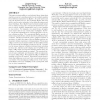Free Online Productivity Tools
i2Speak
i2Symbol
i2OCR
iTex2Img
iWeb2Print
iWeb2Shot
i2Type
iPdf2Split
iPdf2Merge
i2Bopomofo
i2Arabic
i2Style
i2Image
i2PDF
iLatex2Rtf
Sci2ools
109
click to vote
MOBICOM
2015
ACM
2015
ACM
mZig: Enabling Multi-Packet Reception in ZigBee
This paper presents mZig, a novel physical layer design that enables a receiver to simultaneously decode multiple packets from different transmitters in ZigBee. As a low-power and low-cost wireless protocol, the promising ZigBee has been widely used in sensor networks, cyber-physical systems, and smart buildings. Since ZigBee based networks usually adopt tree or cluster topology, the convergecast scenarios are common in which multiple transmitters need to send packets to one receiver. For example, in a smart home, all appliances report data to one control plane via ZigBee. However, concurrent transmissions in convergecast lead to the severe collision problem. The conventional ZigBee avoids collisions using backoff time, which introduces additional time overhead. Advanced methods resolve collisions instead of avoidance, in which the state-of-the-art ZigZag resolves one m-packet collision requiring m retransmissions. We propose mZig to resolve one m-packet collision by this collision ...
| Added | 14 Apr 2016 |
| Updated | 14 Apr 2016 |
| Type | Journal |
| Year | 2015 |
| Where | MOBICOM |
| Authors | Linghe Kong, Xue Liu |
Comments (0)

